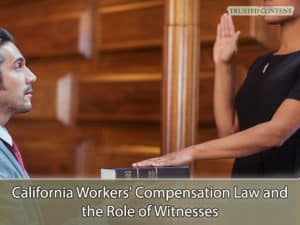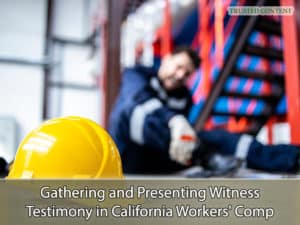Strengthening Your Ontario, California Workers’ Comp Claim with Witness Testimonies
Workers' compensation is designed to provide medical benefits and wage replacement to employees who are injured on the job or suffer from work-related illnesses. However, obtaining these benefits often requires strong evidence, particularly from witness testimonies. Witnesses can offer critical support by providing insights into the circumstances of the accident and its aftermath. The role of witnesses becomes indispensable when establishing the nature of the injury, its impact on work abilities, and any negligence involved in causing the incident. A successful workers' compensation claim relies on presenting a comprehensive view of the incident. This includes detailing how the injury occurred, the immediate aftermath, and the medical treatment received. By corroborating the injured worker's account, witness testimonies help to establish credibility and validate the claim. This article explores the vital role of witnesses in California workers' compensation cases and provides guidance on how to effectively gather and present their testimonies.

California Workers' Compensation Law and the Role of Witnesses
California Workers' Compensation Law and the Role of Witnesses
California's workers' compensation system operates under specific laws that outline the rights and responsibilities of injured workers. According to the California Labor Code, every employer is required to provide workers' compensation benefits to employees injured on the job. These benefits include medical care, temporary and permanent disability benefits, and vocational rehabilitation. Witnesses play a critical role in substantiating a workers' compensation claim under this framework. Their testimonies help to establish key facts about the incident, such as how the injury occurred, whether it was work-related, and the extent of the injury's impact on the worker's ability to perform job duties.
Types of Witnesses in Workers' Compensation Cases
Witnesses can be broadly categorized into three types: lay witnesses, medical witnesses, and expert witnesses. Each type plays a unique role in substantiating a workers' compensation claim.
Lay Witnesses
Lay witnesses are individuals who have direct knowledge of the accident but lack specialized training or expertise. They include co-workers, supervisors, or anyone present at the time of the injury. Their testimonies can provide valuable context about the work environment and the circumstances leading to the accident. A co-worker's testimony may help clarify how the injury occurred, especially if the accident was unwitnessed or disputed. A supervisor can confirm that the injured worker was present on the job site and engaged in work-related activities. Additionally, lay witnesses can describe changes in the worker's behavior, mobility, or ability to perform tasks after the injury, supporting claims for temporary or permanent disability benefits.
Medical Witnesses
Medical witnesses include treating physicians or medical experts who provide professional insights into the nature and extent of the worker's injuries. Their evaluations, medical records, and expert opinions can greatly influence the outcome of a case. A treating physician's testimony can link the injury directly to the workplace incident, establish the severity of the injury, and outline the recommended treatment plan. Medical experts, on the other hand, provide a more objective analysis of the injury's impact and may testify about the worker's functional capacity, impairment ratings, and prognosis for recovery.
Expert Witnesses
Expert witnesses possess specialized knowledge and qualifications relevant to the case. They may include vocational experts, accident reconstruction specialists, and safety engineers. Their expertise can help establish liability or quantify the impact of the injuries on the worker's ability to perform job duties.
A vocational expert can assess the injured worker's transferable skills and employability in light of the injury. An accident reconstruction specialist can analyze the accident scene, equipment involved, and safety protocols to determine if any negligence contributed to the incident. Safety engineers can evaluate workplace hazards and compliance with safety regulations.

Gathering and Presenting Witness Testimony in California Workers' Compensation Cases
Gathering and Presenting Witness Testimony in California Workers' Compensation Cases
Initial Witness Identification
Identifying potential witnesses promptly after an accident is crucial for building a strong workers' compensation case. Start by gathering accurate information and contact details from co-workers, supervisors, or anyone who may have witnessed the incident or its immediate aftermath. Ask the injured worker to recall who was nearby at the time of the accident and who provided assistance afterward.
In addition to co-workers and supervisors, consider other individuals who might have relevant information, such as customers, delivery personnel, or security staff. Having a comprehensive list of potential witnesses ensures a robust set of testimonies to support the claim.
Securing Witness Statements
Obtaining comprehensive and accurate statements from witnesses is essential for strengthening the workers' compensation case. Witnesses should provide detailed accounts of the incident, including:
– The events leading up to the accident
– The location and conditions at the accident scene
– The injured worker's activities before the accident
– The immediate aftermath of the accident
– Any changes in the injured worker's behavior or abilities
Witnesses should be encouraged to describe their observations clearly and consistently. Preparing witnesses for depositions and hearings is key to ensuring effective testimonies. Encourage them to review their statements before the deposition and answer questions truthfully and confidently.
Effective Presentation of Witness Testimony
Strategies for presenting witness testimonies include:
– Organizing testimonies by type (lay, medical, expert)
– Highlighting key details that support the worker's claim
– Emphasizing the consistency of testimonies across multiple witnesses
– Using diagrams, photographs, or video evidence to support witness accounts
– Contrasting credible witness testimonies with inconsistent or conflicting defense evidence
Challenges in Utilizing Witnesses in Workers' Compensation Cases
Despite the value of witness testimonies, several challenges can arise when using them in workers' compensation cases.
Credibility Issues: Some witnesses may lack credibility due to biases, personal relationships with the injured worker, or conflicting accounts of the incident. The defense may attempt to discredit lay witnesses by highlighting inconsistencies in their testimonies.
Availability: Witnesses might be unavailable for depositions or hearings due to scheduling conflicts, relocation, or other reasons. This unavailability can weaken the impact of their testimonies.
Inconsistencies: Differing recollections of events can create inconsistencies in testimonies. Conflicting statements between witnesses or with the injured worker's account may undermine the credibility of the case.
Memory Loss: Witnesses may forget crucial details over time, especially if the incident occurred several months or years ago.
Intimidation: Some witnesses may feel intimidated by the legal process or fear retaliation from their employer, leading to reluctance in providing honest testimonies.
Overcoming these challenges requires careful witness preparation, corroborating evidence, and strategic presentation. Witnesses should be encouraged to review their statements before depositions, remain consistent in their accounts, and avoid exaggerating or speculating about the incident.
Napolin Accident Injury Lawyer’s Extensive Litigation Experience in Workers' Compensation
Napolin Accident Injury Lawyer possesses extensive litigation experience in workers' compensation law, including the strategic use of witness testimonies. We leverage our expertise to build strong cases, ensuring injured workers have the best possible representation. Our legal team understands the nuances of California workers' compensation law and has a proven track record of success. We meticulously gather and present witness testimonies to build compelling arguments for our clients. This comprehensive approach ensures that every aspect of the incident is covered, leaving no room for doubt about the validity of the injured worker's claim.
We have helped numerous clients secure their rightful benefits by effectively utilizing lay, medical, and expert witness testimonies. Our firm provides personalized legal strategies tailored to each client's unique circumstances, ensuring the best possible outcome for their case.

Strengthening Your Ontario, California Workers' Comp Claim with Witness Testimonies
Strengthening Your Ontario, California Workers' Comp Claim with Witness Testimonies
Witness testimonies play a crucial role in strengthening workers' compensation claims in California. By providing detailed insights into the accident and its impact, lay, medical, and expert witnesses help substantiate the injured worker's claim and maximize their benefits. Napolin Accident Injury Lawyer is dedicated to helping injured workers secure their rights and obtain the compensation they deserve. If you need legal help, call us at (909) 962-8415 for a free consultation. Our firm has extensive litigation experience and provides comprehensive support to secure your claim.
With our strategic use of witness testimonies, we can help you build a strong case and ensure your rights are protected. Don't delay – reach out to us today to secure your workers' compensation benefits with confidence.
